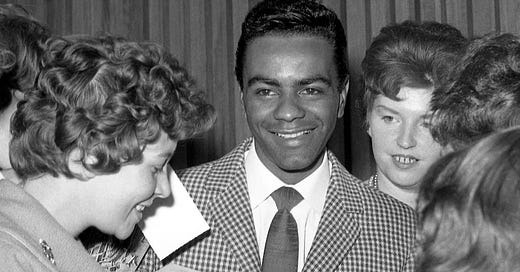Nicknamed the “Voice of Romance,” Johnny Mathis Was Always Referring to Queer Love.
When after a nearly 70-year career, Johnny Mathis took a final curtain call this past weekend, musical luminaries paid tribute in recorded messages.
“You might be responsible for a lot of little children in this world,” joked Barry Manilow, the out star who said Mathis’ music was playing during his first make-out session growing up in Brooklyn. “Really, screw George Washington; you are the father of our country, Johnny.”
Mathis’ voice is synonymous with romance. From the late 1950s onward, Johnny Mathis’ smooth tenor and timeless ballads like “Chances Are” and “Misty” became the soundtrack of countless love stories. But behind the lush orchestration and chart-topping success lies a quieter, more radical legacy. Mathis was among the first globally beloved pop stars to come out—and he did so as a Black and Native American man in an era that was hostile not just to queerness, but to intersectional identity itself.
Born in 1935 in Gilmer, Texas, and raised in San Francisco, Mathis was the fourth of seven children in a working-class mixed race family. Being Black and Native American in Jim Crow America came with a constant awareness of scrutiny, which undoubtedly shaped Mathis’ careful public image.
By the late 1950s, Mathis had become a household name. His 1958 compilation Johnny’s Greatest Hits spent nearly 10 years on the Billboard charts, a record unbroken for decades. His presence on TV variety shows and movie soundtracks marked him as a rare figure—a young, non-white man allowed to sing romantic ballads to mainstream (and largely white) audiences.
In a 2016 interview with Billboard, Mathis reflected on his early career, acknowledging the challenges he faced as a Black artist in a predominantly white industry. “I was just trying to be accepted, to be heard,” he said. “The rest, I hoped, would follow.” In 1982, Mathis acknowledged in Us magazine, “Homosexuality is a way of life that I’ve grown accustomed to.” The backlash was immediate and vicious—death threats poured in, and he didn’t speak publicly about his sexuality again for nearly two decades. In a 2017 interview with CBS Sunday Morning, he explained that he had stayed silent for years out of fear: “It was not a good time to be gay,” he said.
Mathis never marched or gave political speeches. He didn’t have to. Being himself, even behind the veil of discretion, carved out space for future generations of queer artists to live more fully in the open.
Take for example one of Mathis’s most haunting recordings—1957’s “Wild Is the Wind,” performed for the opening credits of the film of the same name. The song, nominated for an Oscar, has lived many lives. The curated Mathis persona depended on acceptance by mainstream audiences, turning him romantic yet sexually elusive and bordering on milquetoast. But when he sang this tumultuous ballad, Mathis transformed into a swirling tornado of coded desire. All of a sudden he’s a vulnerable mess, drowning in his own emotions.
You kiss me
With your kiss my life begins
You’re spring to me, all things to me
Don’t you know, you’re life itself!Like the leaf clings to the tree
Oh, my darling, cling to me
For we’re like creatures of the wind, and wild is the wind
Wild is the wind
While the lyrics aren’t overtly queer, Mathis revealed just enough of his true desire in the song’s delivery to be recognized by queer fans. “Wild is the Wind” became a calling card for other queer icons including Nina Simone, who recorded her cover in 1966, David Bowie in 1976, and George Michael in 1999, with each artist interpreting it through their own lens of longing, vulnerability, and identity. That this torch song passed through the hands of so many queer artists over the decades is no coincidence.
Nina Simone’s version:
David Bowie’s version:
George Michael’s version:
When we talk about queer liberation in music, it’s easy to focus on the loud, the defiant, the unapologetically visible. But there’s power in subtlety—in endurance. At age 89, Mathis announced his retirement after nearly seven decades on stage, with his final performance on May 18 at the Bergen Performing Arts Center in Englewood, New Jersey during the “Voice of Romance” tour.
“Things take time,” Mathis told Billboard in 2016. “People are stubborn about what they perceive to be the right thing or the wrong thing, and it takes a long time to filter this human condition. There’s a waiting period until people catch up. But if you have patience—which it takes when someone thinks differently from you—everybody always catches up. That patience is a wonderful virtue.”
Johnny Mathis’s legacy is not only in the notes he sang but in the silences he endured.






I listened to the song by all four artists, all interpretations were fabulous.
I'd never heard Wild is the Wind before, and now it's all I want to listen to. Soooo good. Thank you for sharing.